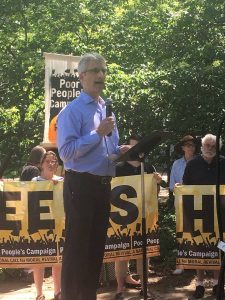The “I” Word – A Weekly Letter From Rabbi Davis – June 8, 2018
Shalom Chaverim
This past week I attended and participated in a rally at the Capitol. It was one of a series of rallies organized by the Poor Peoples Campaign. This rally focused on the effects of climate change on people experiencing poverty which are often people of color.
It was one of a series of rallies organized by the Poor Peoples Campaign. This rally focused on the effects of climate change on people experiencing poverty which are often people of color.
The specific issue at hand revolved around Line 3, a Canadian oil pipeline whose proposed route passes through Minnesota wetlands, rice fields and alongside native lands. 500 faith leaders from around the state and representing the diversity of religious faiths of Minnesota signed a letter opposing Line 3 that was presented to Governor Dayton.
I was asked by Minnesota Interfaith Power & Light, the interfaith coalition working on issues of climate justice, to say a few words to kick off the rally. I spoke about the Torah’s description of humans as “adam min haadama earthlings from the earth,” saying “that is our origin, our fate and our charge.” We are to live in harmony with the earth to create a sustainable future by reducing our dependence on fossil fuels.
Other speeches, songs and poems by bishops, pastors, Native elders, etc. were moving and inspiring. And then I heard the “I” word. It didn’t come as a surprise. I had a feeling it would come. I am talking about intersectionality.
Intersectionality is the notion that interlocking systems of power impact those most marginalized. Therefore, when you fight for justice and against oppression on one issue, you should naturally align yourself on other issues against other oppressors.
In this case, one speaker got up to speak about the impact of climate change on her Native American community. In the very next breath, she asked us to hold in our hearts Palestinians in Gaza who were also facing oppression.
Here I thought I was fighting to reduce dependence on fossil fuel and fighting for the rights of the indigenous people of Minnesota when all-of-a-sudden, the Israeli-Palestinian conflict was introduced. In this linkage, Israel is likened to a big oil company, poisoning the earth and stealing native lands.
I would’ve liked to have had an opportunity speak with the speaker who raised the issue of Gaza. I would have told her that my people, the Jewish people, are native to the Land of Israel, that our settlement on the land precedes that of Palestinians by thousands of years, that we were kicked off our land and that Israelis see themselves as the oppressed party. The rally moved on so I didn’t have a chance to have that conversation. But I’ve continued to think about it all week.
Intersectionality is quite common at these kinds of rallies. Unfortunately, sometimes it compels people to walk away. They say, for example, “If you are going to use this occasion to criticize Israel, I can’t be part of your call for climate justice.” As difficult as it is, I want to challenge us to lean into those conversations and those conflicts.
I challenge intersectionalists to work harder to appreciate distinctions between social justice issues. At the same time, I challenge those whose impulse is to walk away to develop the capacity to agree to disagree. That, in fact, was the very basis of our interfaith gathering. Here we were, people of various faith backgrounds who have major theological differences but who share a common vision for our State and our planet.
At the climate change rally, I spoke about faith communities having the ability to see the big picture and to mark time in millennia rather than quarters. Applying those same skills to the difficult issue of intersectionality, I hope that we keep track of our shared social justice goals including the long-term dream to grow together in understanding with our fellow earthlings.
L’Shalom,
Rabbi Alexander Davis
adavis@bethelsynagogue.org
